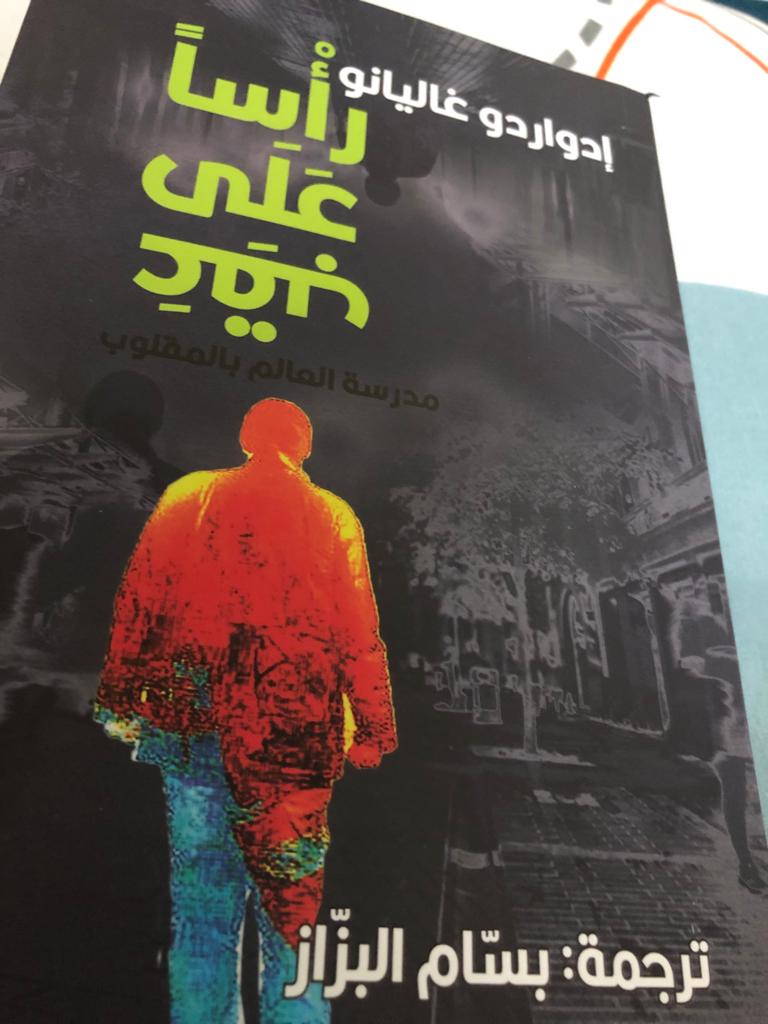
An Attempt at Sudanizing Eduardo Galeano
By Al-Asmai Bashri
The novel Upside Down: The World as an Inside-Out School by the Uruguayan Eduardo Galeano, attempts to bring the Sudanese essence to it, simply in a time unlike that which many realistic writings have spoken about, or that which political attempts seek to revive. The current time in Sudan is pure and distinct, defying imagination, absent from research, contemplation, and vision.
The present scene is overflowing with images, fantasies, and formations in our violent reality, a reality that leaves no time for analysis or writing. It is lost, and the imagination constantly seeks to find.
Not only is it a time of war, gratuitous death, and exhausting displacement, but it is also a time for reflecting on what has led to the current existential predicament, a situation that has affected societies, nations, symbols, and leaders.
My granddaughter Catalina was ten years old, and we were strolling down one of the streets of Buenos Aires when someone approached and asked me to sign one of my books. I dont remember which book it was... We continued walking, both of us silent and embracing, until Catalina moved her head and formulated this encouraging comment: I dont know why theres so much interest in you if even I dont read you!! This is how Eduardo Galeano once spoke.
But in Sudan, there are those who read him with immense pleasure, feeling their own lives moving within their tragedies, mourning their fate. They read him as if he were one of the Sudanese novelists who knows our true history, draws inspiration from our bitter experiences, and portrays reality as it is while we read Upside Down with immense pleasure, as if it were the school of Sudan turned upside down, overpowered and subdued.
Galeano writes in passages from a chapter titled The Hungry Devil: Many participated in the crime with prior knowledge and awareness, with the enthusiasm deserving of a noble cause and the zeal befitting the loftiest goal.
And also, The laws of immunity seem to be cut with the same scissors. Democracies have reached there as if they were assigned two tasks with no third option: paying off debts and forgetting past crimes. They arrived grateful to the military, as the terrorism they practiced created a conducive atmosphere for foreign investments and paved the way, in the following years, for selling nations at the price of bananas, without accountability or responsibility. Under the umbrella of democracy, they abandoned national sovereignty, turned their backs to labor laws, and dismantled public services. Everything was done with relative ease, after societies were depleted of their best energies, regaining their civil rights in the eighties, living in an atmosphere of lies and fear while suffering from weakness and seeking the life-giving oxygen that democracy promised but failed to deliver, either due to incapacity or reluctance.
The well-known writer Isabel Allende spoke about Galeanos book, saying that her copy of his book was one of the few things she carried with her when she fled Chile in 1973 after the military coup led by Augusto Pinochet. She described it as a blend of precise details, political creed, poetic impulse, and good narrative storytelling.
From another excerpt from the same chapter, we read, Elected governments, in their pursuit of justice, were seen as revenge-seekers, and preserving memory was seen as an invitation to chaos. They sprinkled holy water on the foreheads of men who had practiced state terrorism. In the name of democratic stability and under the banner of national reconciliation, they passed laws of immunity that denied justice, buried the past, and called for amnesia.
The Sudanese novelist Mansour Elsouwaim noted that as you read Galeano, you will notice a clever and strange connection, or mixture, that he makes in reading history.
Bashir Alsowaim says that Galeanos skillful craftsmanship and his invocation of history to unravel the present have a unique power, and he adds, The bitter irony of human folly, manifested in repetitive imitative buffoonery or farce, as if we are now amidst this absurdity, reading one of Galeanos enchanting, satirical, and shocking texts to the point of bitterness, and the message still holds true: Galeanos essential lesson is to be alert and vigilant against complacency, and complacency is us and what we are reaping now.
The Sudanese critic and writer Ahmed Sadiq, who translated Allendes article about Galeano, says about him that throughout his entire human history and creative vision, he belongs to our reality. He adds, He is a man who wrote in defense of society and criticized the violence of the state, especially those dominated by the military, and Sadiq concludes that his renowned trilogy about Fire Memory and his book about football are a quintessential Sudanese memory.
Eduardo Galeano, a Uruguayan journalist, writer, and novelist, was considered among other things a prominent figure in the field of world football literature and a literary giant among the remaining Latin Americans.
His most famous works include The Open Veins of Latin America and the trilogy Memory of Fire among others.
Galeano once said of himself, I am a writer obsessed with remembering, remembering the past of America, and above all, the past of Latin America, the intimate land with its peculiarities, which was condemned to lose its memory. Good heavens, did he actually say condemned to lose its memory?


